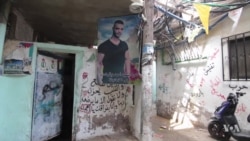ດ້ວຍການສຳຫຼວດສຳມະໂນຄົວ ຂອງອົບພະຍົບ ປາແລັສໄຕນ ກຳ ລັງດຳເນີນໄປຢ່າງ
ເປັນທາງການຢຢຢ່າງຄົບຖ້ວນເປັນຄັ້ງທຳອິດ ແລະ ແຜນການ ແນວໜ້າເພື່ອສົ່ງເສີມ
ສິດທິຂອງພວກເຂົາເຈົ້ານັ້ນ, ປະຊາຊົນ ປາແລັສ ໄຕນ ຈຶ່ງຫວັງວ່າ ຈະໄດ້ເຫັນສະຖາ
ນະພາບຂອງພວກເຂົາເຈົ້າດີຂຶ້ນກວ່າເກົ່າ. ແຕ່ບູລິມະສິດສູງສຸດຂອງລັດຖະບານ ເລບາ
ນັອນ ນັ້ນ ກໍແມ່ນຍງສືບຕໍ່ເຫັນວ່າ ແມ່ນການຮັກສາຄວາມປອດໄພໃນສູນອົບພະຍົບ
ປາແລັສໄຕນ, ຈົນນຳໄປສູ່ການມີຄຳຖາມຂຶ້ນມາວ່າ ຈະມີຫຍັງປ່ຽນແປງສຳລັບພວກ
ອົບພະຍົບແທ້ ຫຼືບໍ່. ໃນອັນດັບຕໍ່ໄປ ພຸດທະສອນ ຈະນຳລາຍລະອຽດມາສະ ເໜີທ່ານ.
ທ້າວ ອາມັດ ມີອາຍຸໄດ້ 20 ປີ ໃນເວລາທີ່ລາວຖືກໄຟຊັອດ, ຍ້ອນໄປແຕະເອົາຊາຍໄຟ
ຄວາມແຮງສູງພວກນີ້ ທີ່ຫ້ອຍຢູ່ເທິງສູນອົບພະຍົບ ປາແລັສໄຕນ ໃນປະເທດ ເລບາ
ນັອນ ທີ່ລາວເອີ້ນວ່າບ້ານຂອງລາວນັ້ນ. ແມ່ຂອງລາວ ບໍ່ເຊື່ອວ່າຊີວິດຢູ່ທີ່ນີ້ ຈະດີຂຶ້ນ
ກວ່າເກົ່າສຳລັບຊາວ ປາແລັສໄຕນ.
ນາງ Iman Muhammad ແມ່ຂອງທ້າວ ອາມັດ ກ່າວວ່າ “ມັນບໍ່ມີເຫດຜົນສຳລັບວ່າ
ພວກເຮົາຈະຖືກປະຕິບັດຕໍ່ແນວໃດ. ຄົນ ປາແລັສໄຕນ ບໍ່ໄດ້ໄປຮຸກຮານໃຜຢູ່ນີ້ ແລະ
ເປັນຫຍັງຈຶ່ງເຮັດກັບພວກເຮົາແນວນີ້. ມັນຄືກັບຢູ່ໃນຄຸກ."
ອົບພະຍົບ ປາແລັສໄຕນ ໃນປະເທດ ເລບານັອນ ໄດ້ປະສົບກັບຄວາມທຸກຍາກມາຫຼາຍທົດສະວັດແລ້ວ, ອາໄສຢູ່ໃນສູນອົບພະຍົບທີ່ຖືກຕັ້ງຂຶ້ນມາ ດົນນານຄືແຫ່ງນີ້ ຕັ້ງຢູ່ພາກ
ໃຕ້ຂອງນະຄອນຫຼວງ ເບຣຸດ. ເປັນຊຸມຊົນແອອັດ ທີ່ຖືກຈຳກັດໂອກາດຕ່າງໆ.
ແຕ່ເມື່ອບໍ່ດົນມານີ້, ການມີກິດຈະກຳທີ່ເພີ່ມຂຶ້ນ ທັງໃນຖະໜົນແຫ່ງຕ່າງໆພວກນີ້ ແລະ
ລັດຖະບານລະດັບສູງນັ້ນ ແມ່ນໄດ້ກະຕຸ້ນໃຫ້ປະຊາຊົນບາງຄົນມີຄວາມຫວັງສຳລັບອະ
ນາຄົດທີ່ສົດໄສກວ່າເກົ່າ.
ໃນການປະສານງານກັນ ຈາກທີ່ນີ້, ການກວດສອບສຳມະໂນຄົວຄັ້ງທຳອິດຈາກປະຕູ
ໜຶ່ງໄປຫາອີກປະຕູໜຶ່ງໃນປະເທດ ແມ່ນກຳລັງເລີ່ມຂຶ້ນ. ໃນເວລາດຽວກັນ, ແຜນການ
ໃໝ່ສຳລັບການປັບປຸງສິດທິຂອງຊາວ ປາແລັສໄຕນ ກໍແມ່ນໄດ້ຮັບການສະໜັບສະໜູນ
ຈາກເກືອບທຸກໆພັກການເມືອງຂອງ ເລບານັອນ.
ທ່ານ Abdel Nasser Al-Aya ຈາກພັກຄະນະກຳມະການ ເຈລະຈາ ເລບານັອນ
ປາແລັສໄຕນ ກ່າວວ່າ “ໂດຍພື້ນຖານແລ້ວ ເອກະສານນີ້ ເປັນຕົວແທນໃຫ້ການສຳ
ຫຼວດສຳມະໂນຄົວ ເລບານັອນ ຄັ້ງທຳອິດ ໃນບັນດາອົບພະຍົບ ປາແລັສໄຕນ ທີ່ອາໄສ
ຢູ່ໃນ ເລບານັອນ."
ໃນເມື່ອເຂົາເຈົ້າສາມາດທຳການສ້າງສາໃນສູນອົບພະຍົບຄືແຫ່ງນີ້, ແຕ່ຊາວ ປາແລັສ
ໄຕນ ແມ່ນບໍ່ສາມາດເປັນເຈົ້າຂອງຊັບສິນໄດ້ ໃນເລບານັອນ. ໃນຂະນະທີ່ບາງຄົນທີ່ອາ
ໄສຢູ່ທີ່ນີ້ ອາດຫາວິທີທຳມາຫາກິນໄດ້ນັ້ນ, ກົດໝາຍ ເລບານັອນ ກໍໄດ້ກີດກັນຊາວ
ປາແລັສໄຕນ ຈາກການປະກອບອາຊີບຫຼາຍຢ່າງ.
ໃນການຖືກບັງຄັບໃຫ້ເດີນທາງເຂົ້າປະເທດ ເລບານັອນ ໃນລະຫວ່າງການສ້າງຕັ້ງ
ອິສຣາແອລ ໃນປີ 1948 ນັ້ນ, ມັນມີຄວາມເປັນຫ່ວງວ່າ ການປະຕິບັດຢ່າງເທົ່າທຽມກັນ
ຂອງຊາວ ປາແລັສໄຕນ ອາດກະຕຸ້ນໃຫ້ພວກເຂົາເຈົ້າລົ້ມເລີກຄວາມຝັນ ທີ່ຈະກັບຄືນ
ສູ່ບ້ານເກີດຂອງເຂົາເຈົ້າ ແລະ ຕັ້ງຖິ່ນຖານໃນ ເລບານັອນ ຢ່າງຖາວອນ. ສິ່ງນີ້ເປັນ
ການກະຕຸ້ນໃຫ້ມີນະໂຍບາຍທີ່ຮຸນແຮງ, ເຊັ່ນດຽວກັບບົດບາດຂອງຊາວ ປາແລັສໄຕນ
ບາງກຸ່ມ ໃນສົງຄາມກາງເມືອງຂອງ ເລບານັອນ.
ແຜນການໃໝ່ໄດ້ຮຽກຮ້ອງໃຫ້ປັບປຸງແນວຄິດນີ້ຄືນໃໝ່, ລວມທັງກົດລະບຽບແຮງງານ
ແລະ ຊັບສິນ, ພ້ອມດ້ວຍວາງການສຳຫຼວດສຳມະໂນຄົວ ໃຫ້ເປັນເຄື່ອງມືທີ່ມີຄວາມ
ສຳຄັນ ໃນການສ້າງນະໂຍບາຍທີ່ດີຂຶ້ນກວ່າເກົ່າ.
ແຮງຈູງໃຈຢູ່ເບື້ອງຫລັງຂອງແຜນການ ແມ່ນບໍ່ໄດ້ເຫັນແກ່ຜົນປະໂຫຍດຂອງຄົນອື່ນ
ຢ່າງສິ້ນເຊີງ. ຄວາມຮຸນແຮງໃນສູນອົບພະຍົບບາງແຫ່ງ ໄດ້ສະໜອງຫຼັກຖານ ທີ່ພຽງພໍ
ວ່າສະພາບການຮ້າຍແຮງດັ່ງກ່າວຈະຊ່ວຍການແຜ່ຂະຫຍາຍລັດທິຫົວຮຸນແຮງ. ບາງ
ຄົນເຊື່ອວ່າແຜນການສຳຫຼວດສຳມະໂນຄົວ ຈະໃຫ້ຜົນປະໂຫຍດແກ່ຊາວ ເລບານັອນ
ຫຼາຍກວ່າຊາວ ປາແລັສໄຕນ.
ແຕ່ກັບໄປໃນເທດສະບານ Burj al Barajneh, ເຊິ່ງຄືກັນກັບບ່ອນອື່ນນັ້ນ, ຊາວ
ປາແລັສໄຕນ ສ່ວນໃຫຍ່ຕ້ອງການພຽງແຕ່ດຳລົງຊີວິດໃນຄວາມສະຫງົບ ແລະ ເພື່ອ
ລູກຫຼານຂອງເຂົາເຈົ້າໃຫ້ເຕີບໃຫຍ່ບໍ່ພຽງແຕ່ໃຫ້ໄດ້ຮັບການສຶກສາເທົ່ານັ້ນ, ແຕ່ພ້ອມ
ກັບອະນາຄົດທີ່ດີດ້ວຍ.
ທ່ານນາງ Mariam Shaar ຈາກສະມາຄົມໂຄງການຂອງແມ່ຍິງ ກ່າວວ່າ “ສິ່ງທີ່ພວກ
ເຮົາພະຍາຍາມທີ່ຈະບອກລັດຖະບານ ເລບານັອນ ກໍແມ່ນວ່າ ສິດທິພົນລະເມືອງຂອງ
ພວກເຮົາ ບໍ່ໄດ້ເຊື່ອມໂຍງກັບສິດທິຂອງພວກເຮົາທີ່ຈະເດີນທາງກັບຄືນສູ່ບ້ານເກີດ
ຂອງພວກເຮົາ. ເຮົາຕ້ອງການພຽງແຕ່ອາໄສຢູ່ໃນສູນອົບພະຍົບດ້ວຍຄວາມເຫັນອົກ
ເຫັນໃຈເທົ່ານັ້ນ.”
With the first ever full census of Palestinian refugees in Lebanon underway, and a groundbreaking plan to strengthen their rights, Palestinians are hoping to see an improvement in their conditions. But a top priority for the Lebanese government continues to be security in the Palestinian camps, leading some to question whether anything will really change for the refugees.
Ahmad was 20 years old when he was electrocuted, knocking into these high voltage cables that dangerously dangle over the Palestinian refugee camp in Lebanon he called home.
His mother is cynical that life here will get any better for Palestinians.
((IMAN MUHAMMAD SHEIKHA, AHMAD'S MOTHER (in Arabic)))
"There is no reason (for how we are treated). The Palestinians didn't invade anyone here for us to be treated in this way - it's like living in a prison."
Palestinian refugees in Lebanon have endured decades of poverty, living in long-established camps like this one in south Beirut; ghettoes that stifle opportunities.
Yet lately, a flurry of activity - both in these streets and in the corridors of power - is prompting some to hope for a brighter future.
Coordinated from here, the first door-to-door census of Palestinians in the country is underway.At the same time, a new plan for improving Palestinian rights has received support from nearly all the Lebanese political parties .
((ABDEL NASSER AL-AYI, LEBANESE PALESTINIAN DIALOGUE COMMITTEE (in English)))
"Basically this document represents the first Lebanese consensus among the Palestinian refugees in Lebanon."
While they may build in camps like this one, Palestinians cannot own property in Lebanon.While some here may find ways to earn a living, laws exclude Palestinians from many professions.
Forced into Lebanon during the creation of Israel in 1948, there were concerns that equal treatment of Palestinians would encourage them to give up their dream of returning home and settle permanently in Lebanon. This has fueled harsh policies, as did the role some Palestinian groups played in Lebanon's civil war.
The new blueprint calls for an overhaul in this thinking, including the labor and property rules, with the census positioned as a crucial tool in creating better policy.
Motivations behind the plan are not purely altruistic. Violence at some of the camps provides ample evidence that such dire conditions help breed extremism. Some believe the census plans will benefit the Lebanese rather than the Palestinians.
But back in Burj al Barajneh, as elsewhere, most Palestinians just want to live in peace and for their children to grow up not just with an education, but with a future too.
(MARIAM SHAAR, WOMEN'S PROGRAMME ASSOCIATION (in Arabic)))
"What we are trying to tell the Lebanese government is that our civil rights are not connected with our right to return to our homeland. We just want to live in a humane way inside the camps."





